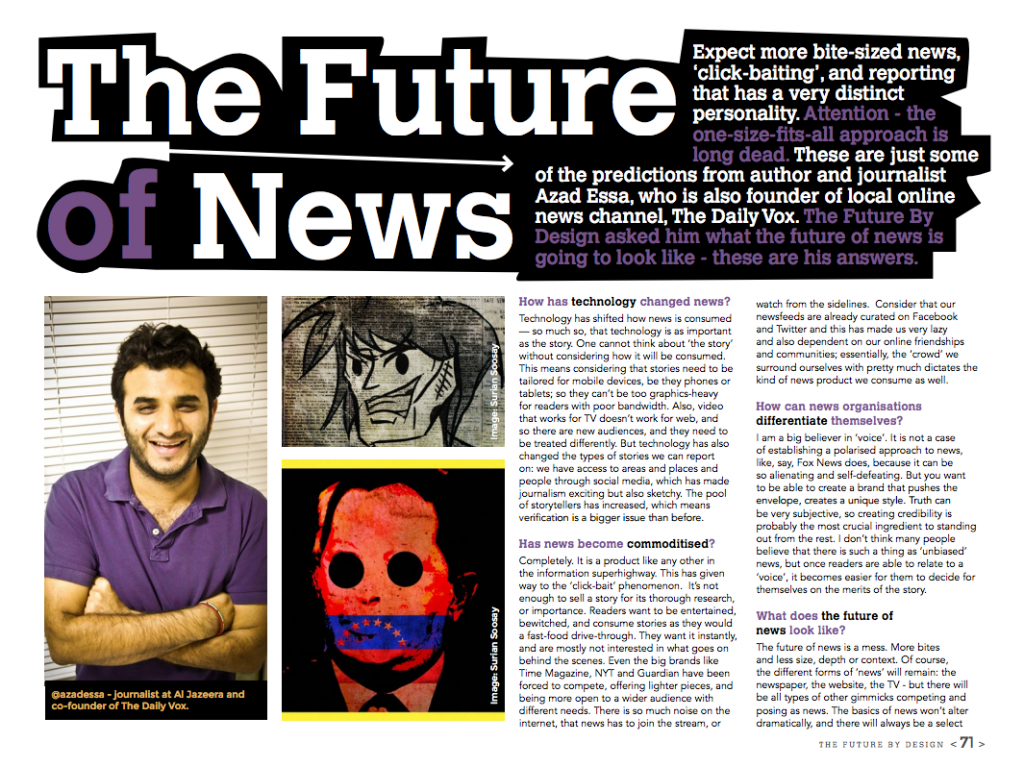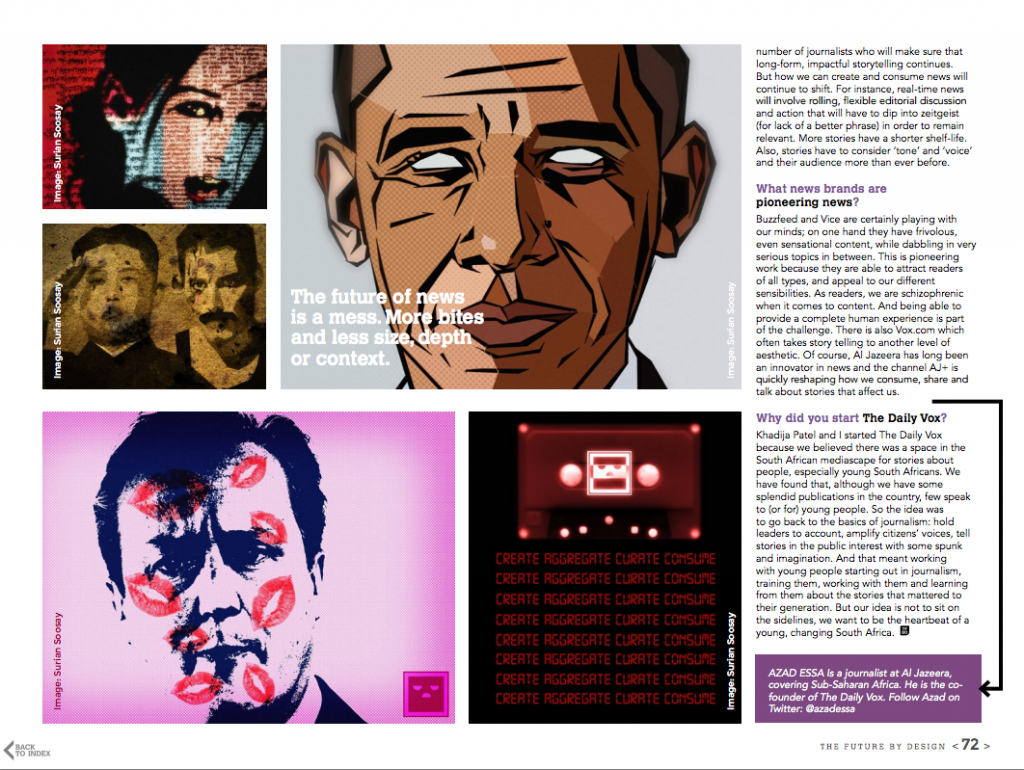August 2017
Rumana Akoob spoke to Medium about using Atlas for Africa to transform intimidating data sets into simple and accessible information, especially when the well-being of vulnerable groups is on the line.
July 2017
Rumana Akoob spoke to Radio 786 about Indian identity in post-apartheid South Africa, and the realities of anti-blackness in the Indian Muslim community.
Azad Essa spoke to Tree Shake about fake news in the post-truth world, news media’s obsession with profit and our duty to take charge of the information we share.
June 2017
June 13 is International Albinism Awareness Day, and Rumana Akoob spoke to Power FM about whether the South African government has any policies in place to make the lives of people from this marginalised group any easier.
Benazir Cassim and 14hundred founder, Nabila Bana spoke to journalism.co.uk about our special partnership with 14hundred, bringing a unique South African Ramadaan experience to Instagram.
May 2017
Azad Essa spoke to JAMLAB about The Daily Vox’s origin story, staying afloat in the digital age and creating space for media rabble rousers.
Benazir Cassim and Faranaaz Parker spoke to journalism.co.uk about gender based violence in South Africa, and The Daily Vox’s collaboration with the Soul City Institute promoting safety in public spaces.
August 2016
Azad Essa spoke to journalism.co.uk about putting the citizen at the centre of news and establishing new traditions in journalism.
Aaisha Dadi Patel spoke to Power FM about Muslim women, France and the #BurkiniBan.
Khadija Patel spoke to American radio station, WNYC from the IEC results centre, where The Daily Vox was covering the 2016 local election results.
July 2016
Mohammed Jameel Abdulla spoke to Voice of the Cape on the reasons behind the disinvitation of controversial journalist Flemming Rose from speaking at the University of Cape Town.
Tendai Marima gave Power FM an update on the situation in Zimbabwe following the #ThisFlag protests and the arrest of pastor Evan Mawarire.
September 2015
On 28 September 2015, The Daily Vox launched a fundraising campaign to raise funds for our fledgling start-up operations. A crowdfunding campaign set up on the popular Indiegogo platform aims to raise R200,000 over four weeks.
August 2015
Our executive editor, Khadija Patel, wrote a piece for the Rhodes Journalism Review and appeared on a panel at the 2015 Highway Africa conference at Rhodes University.
We are confident that we are building a news platform that speaks to young
people, by giving young journalists the space, time and gentle guidance to drive
what we do. But most importantly, we seek to reposition the person on the street,
the ordinary South African, to the forefront of our news agenda. Journalism is
supposed to be vital to democracy, it is supposed to be the harbinger of the public
experience.
Read the full piece here.
May 2015
#FutureByDesign spoke to our very own Azad Essa on the future of news. To read the magazine click here, or take a peek at his answers below.
The Australian Broadcasting Corporation spoke with executive editor Khadija Patel about the xenophobic violence that broke out in Kwazulu-Natal following anti-immigrant comments made by Zulu king Goodwill Zwelithini.
South African president Jacob Zuma has called for calm as anti-immigrant violence spreads. The World speaks to Khadija Patel, co-founder of the online news publication The Daily Vox about the unrest.
Watch the video here:
November 2014
The International Journalists’ Network (IJNet) featured the Daily Vox in a story titled “How a South African news site gives youth a voice and a vocation”.
Even though South Africa’s census data shows youth makes up 59 percent of a 51.7 million population, news operations that cater exclusively to a young demographic are rare.
Now a news site has stepped in to fill this gap. Founded by journalists Khadija Patel and Azad Essa, The Daily Vox offers hard news, satire, news analysis, cartoons, feature articles and opinions – all written by young people for young people.
August 2014
The Financial Mail featured our crowd sourcing efforts in its August 15 edition. Check it out here.
Khadija Patel appeared on the SABC’s Media Monitor where she discussed South African media treatment of some of the week’s biggest stories –
July 2014
Press release – July 2:
Introducing The Daily Vox
The journalism project formerly known as South African Votes 2014 has relaunched as The Daily Vox.
Headed by Azad Essa (Al Jazeera) and Khadija Patel (formerly of the Daily Maverick), The Daily Vox boasts a team of passionate and talented young South African journalists and storytellers, as well as an advisory panel of experienced and respected media professionals. The project has also benefitted from the inclusion of Faranaaz Parker (formerly with Mail & Guardian) as managing editor.
The Daily Vox puts the young citizen at the centre of the news. Our team seeks to find, curate and amplify the voices of young South Africans caught grudgingly between the drudgery of old politics and new protectorates.
Since our official launch on Youth Day (June 16), we have already shown that the South African public is hungry for these stories. We were hoping to draw anywhere between a thousand and two thousand readers a day. But we surpassed these expectations when we got over 70,000 hits within the first week.
Whereas the young are often at the periphery of traditional media, they are our priority. Not the officials and the experts but the people; be it the city centre, urban peripheries or the rural heartlands.
The so-called ‘born frees’ may not have the political consciousness of their predecessors but their struggles are more unclear, their anger far more incendiary.
Their situation has been framed by a messy historical inheritance.
It is time to focus on the here and now, and the daily realities of those whose who will shape the future of this country.
April 2014
Voice of America quoted Khadija Patel on voting trends we picked up through our work.
Press Release April 11, 2014 –
South Africa Votes 2014 Reveals Its Whatsapp Platform
South Africa Votes 2014 today revealed its Whatsapp platform with the goal of encouraging further interaction with South Africans on the ground.
The online media company has engaged with ordinary South Africans in an effort to communicate their stories, ideas and opinions. South Africa’s national elections are fast approaching, and the fervour is rising. In creating a Whatsapp profile, South Africa Votes 2014 has sought to encourage South Africans to have their voices heard in media.
Azad Essa, associate editor of South Africa Votes 2014, said, “We want to give south africans every opportunity to connect with us, to be heard, and whatsapp will help us remain connected to the ground”
“It is also an indication of the imagination we are putting into this project; there are no rules to multiple ways one can tell stories”
Whatsapp is a popular mobile communication platform with both local and international users. The chat application allows users to send images, text messages, audio and videos to their chosen recipients. In this way, Whatsapp enables a range of media content to be curated, allowing South Africans to share their stories both visually, via audio, and in writing.
South Africans who would like to share their stories can add South Africa Votes 2014 to their contact list and begin sending content. These insights will be sent from Whatsapp to the South Africa Votes 2014 website where all media content is published.
Through its Whatsapp profile, South Africa Votes 2014 has made its website more accessible to South Africans on the streets who wish to share their views. The platform will serve as a mechanism to enrich content diversity and ensure that South African citizens can communicate their thoughts with media.
South Africans can add South Africa Votes 2014 on Whatsapp by saving 076 019 5862 to their contact list.
March 2014
Khadija Patel was interviewed on Al Jazeera’s Inside Story about the Public Protector’s report on President Jacob Zuma’s Nkandla home.
Press Release: 13 March 2014 –
South African election website launched
As the country prepares to go to the polls in May, South Africa Votes 2014 intends to add real voices to the swirl of newsgathering, comment and opinion surrounding the election.
Independent journalist and Managing Editor of SA Votes 2014, Khadija Patel (formerly a senior correspondent at the Daily Maverick) heads up a team comprising of journalists, writers, bloggers and social media specialists from all walks of life, ranging from citizen journalists and renowned international South African journalists working for Al Jazeera and The Mercury.
Describing the project, Khadija Patel said the SA VOTES 2014 will make politics relevant to South Africans again: “Election season really is an extended silly season. But there is a greater story in this election than a barrage of “he said”, “she said”. We want to tell the story that goes beyond that, the story of the political spectacle in South Africa as it’s translated into people’s opinions, their attitudes, their experience of the country”.
“People often get put off by politics, because people and their stories often get ignored by rhetoric and debate, SA Votes 2014 intends to be part of an alternate telling of the South African election story of real stories of real people,” said Patel.
One of the features of SA Votes 2014 is to work with young journalists, who will be given the chance to contribute to the debate of South Africa’s future.
“We hope to work with these young journalists from all areas of South African society. We will have them tramping around towns and cities, speaking to people and then telling us what they’ve been speaking about. It’s about the people they quote, the people whose story we want to tell SA Votes 2014 has already partnered with Centre for Fine Art and Animation and Design (CFAD) in Durban.
Nanda Soobben, the head of CFAD said he chose to join SA VOTES 2014 because he wanted to become part of a bigger conversation.
“I think people are going to going to waste their vote, and I just want to use my cartoons to show people how to make their votes count without being biased in anyway,” said Soobben
SA Votes 2014, an independently funded project, free of any political interests will run throughout the election campaign will be updated daily.




